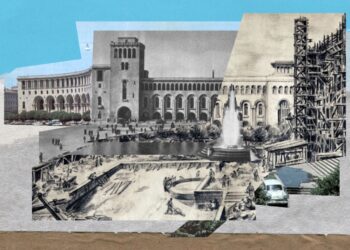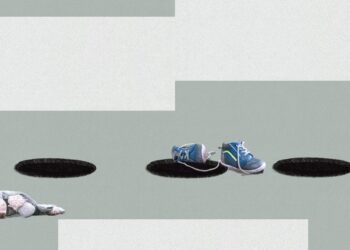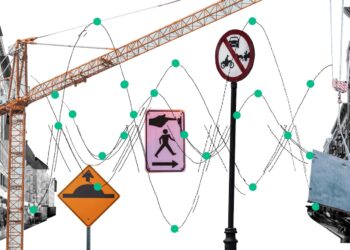
On International Children’s Day, June 1, a video was posted on an online Armenian media news outlet, depicting a middle-aged man hitting a boy on his head and different parts of his body in what appears to be a kitchen. The video sparked outcry, and became another example of the public’s attempt to address unresolved issues in the country.
The article titled, “Exclusive Video: Head of the Criminal Division of Dilijan Police Beats a 16-year-old Boy” features the 58-second long CCTV recording, which shows the officer repeatedly hitting the boy, with brief interjections of words. The boy eventually manages to escape, but what happened next is unclear. An elderly man present at the scene witnesses the violence, but does not intervene in any way.
According to the article, Arsen Ghaytmazian, head of the Dilijan police department’s criminal division (which falls under the jurisdiction of the Ministry of Internal Affairs of Tavush region), enters the Haghartsin Hotel to book a room. The employee asks Ghaytmazian to pay upfront for the room, sparking a discussion about money. Following the argument, Ghaytmazian begins to physically assault the 16-year-old. The video was initially shared on YouTube but has since been taken down for violating the platform’s terms of use. However, it is still available on various social media accounts.
It later became clear that the incident took place on April 10, but the boy’s family only appealed to law enforcement a month later, on May 10. The policeman was temporarily suspended and a criminal case was launched. The child was recognized by the court as a victim. However, since the boy did not sustain injuries, and the high-ranking police officer displayed “ remorse”, the prosecutor’s office decided not to press charges against the perpetrator. Kyaramyan expressed his willingness to apologize for the incident. “I am aware that this incident has received a negative response from the public, and I am prepared to apologize to those who may have also been disappointed in the performance of the law enforcement system,” said the officer.
According to Article 81 of the Criminal Code, a person who commits a crime for the first time can be released from criminal responsibility if the act committed by them is minor or moderate and they cooperate with the prosecution, do not contest the accusation and, in the case of causing damage, compensate or otherwise settle the damage caused by the crime.
Argishti Kyaramyan, the Chair of Armenia’s Investigative Committee, said that releasing a perpetrator on the basis of remorse is not within the Investigative Committee’s powers. He added that both he himself and the Investigative Committee consider it illogical to apply this in cases of abuse of minors.
The Power of an Outcry
The video, posted about two months after the incident, caused a furor. Perhaps as a result of the attention it gained, the prosecutor decided to charge Ghaytmazian with Article 196, Part 2, Clause 3 of the Criminal Code, for causing severe physical pain or severe mental suffering to a minor with imprisonment for a term of three to seven years. On June 3, Ghaytmazian was detained for two months by the court’s decision.
It is not yet known whether the law enforcement officers who did not charge Ghaitmazyan after the incident will be held accountable.
Chapter 5 of the Law on Approving the Disciplinary Code of the Police, which defines the ethical rules for police officers, states that these rules are mandatory for officers both during and outside of official duties. The law outlines several obligations for police officers, including refraining from discrediting the police or police officers for personal gain or other reasons, respecting human rights and freedoms, showing restraint, displaying a respectful attitude towards citizens, and avoiding unnecessary emphasis on their official position.
Article 47 of this law stipulates that failure to comply with these requirements, abuse of official position, or exceeding the limits of official authority can lead to disciplinary or criminal liability. However, in this case, the violation of ethical rules was not taken into account, and the police officer was only charged with causing severe physical pain or severe mental suffering to the minor.
Araks Melkonyan, the president of the Protection of Rights without Borders NGO is certain that the police tried to cover up the criminal case at all costs.
“If a person does not have authority, the process takes much longer: a criminal prosecution is initiated, and a restraining order is applied,” she says. “But by deciding not to initiate criminal prosecution against a high-ranking police officer after just a few days of investigation, the investigative body and the prosecutor’s office have simply demonstrated impunity and patronage of crime.” Melkonyan adds that if it weren’t for public pressure, the case would have been covered up. “Watching this video, you realize how many crimes can be committed out of the view of the camera in police stations, and remain unpunished. Essentially, without public knowledge and outcry, we have total impunity. Unfortunately, experience shows that even when incidents are publicized, police officers are often not held accountable.”
Melkonyan highlights that the way an investigation is conducted is important. “Of course, the inclination to terminate a case quickly suggests that there has been an ineffective investigation, and that important evidence has not been obtained and critical questions were not raised by the investigator,” she says.
While Melkonyan believes that impunity should not be tolerated, she finds it problematic when the prosecutor’s office only takes action in response to public pressure.
“Nevertheless, it is important to carry out an effective investigation. Public passions must be tempered and the investigation must be fair,” she insists. “All incidents must be investigated with proper procedures and with full guarantee of the rights and freedoms of all persons involved, both for the protection of the best interests of the minor and the protection of the rights of the accused.”
The Un-amendable
Police reforms are presented in the pre-election program of the current ruling party, the Civil Contract party. In addition, various members regularly emphasize the need for reform, and a strategy was designed. A new patrol service was established but, as the facts show, the public will probably have to wait a long time for radical changes.
“In Armenia, only the creation of the patrol service is being implemented as a reform in the police system. There are no reforms being made to the police force, criminal investigation, or any other unit, and no action is being taken to improve their reputation. Unfortunately, recent incidents involving the police bear witness to this,” says Melkonyan, adding that there is a lack of political will, as the police are used to defend the authorities, and there is also a shortage of human resources. “However, individuals with criminal tendencies should not be allowed to occupy positions in the police system or any field of public service. When civil society demanded the vetting of the judicial system, including law enforcement agencies, they were also referring to this issue.”
Daniel Ioannisyan, founder and program coordinator of the Union of Informed Citizens NGO and former member of the Police Reform Coordinating Council, is uncertain whether the reform will result in the elimination of such personnel in the police, as the police leadership does not see any issue with it.
“Being exonerated from criminal responsibility based on remorse is, on one hand, ridiculous, and on the other, expected. I would be surprised if they had tried him without a public outcry. It is not possible to say ‘I repent’ and have it considered active remorse. If that were the case, everyone in Armenia who commits a felony or infraction would go to the prosecutor and say that they regret committing the crime, and that would be the end of it.”
Ioannisyan believes that this is an obvious case where a person should be tried and discharged from their job. However, the exact opposite occurred.
“The judicial system is suffering from an illness that needs to be cured. It is a semi-criminal system that simulates fighting crime,” says Iohannisyan, adding that the cost of impunity is the perpetuation of crimes. One of the aims of criminal justice is for people to witness perpetrators being judged for their crimes, which serves as a deterrent. “When people see that others are not tried for those crimes, they too will commit them.”
What About the Best Interests of the Child?
Article 3, Part 1 of the Convention on the Rights of the Child states: “In all actions concerning children, whether undertaken by public or private social welfare institutions, courts of law, administrative authorities or legislative bodies, the best interests of the child shall be a primary consideration.”
After the publication of the video, Human Rights Defender Anahit Manasyan issued a statement indicating that the best interest of every child is a priority for the defender, and that protection of rights must be guaranteed in Armenia.
“A child must be protected from all forms of violence, including physical and psychological abuse, as well as beatings, insults, mockery, neglect, rudeness, exploitation.”
The target of this incident was a 16-year-old boy. First, he was subjected to physical violence. Then the authorities recognized him as the victim, but then closed the case. Two months later, a video was posted in which his face was visible. Furthermore, the full name and surname of the boy, who lives in a small community, were revealed. As it turns out, the minor is also employed. While the law permits minors to work under certain conditions, there are many problems that arise in this situation. It is encouraging that the prosecutor has initiated an investigation into the legal basis of the minor’s employment.
Aida Muradyan, Child Protection expert at World Vision Armenia, is also worried about the protection of the labor rights of minors.
“Minors have labor rights, but they differ due to their age,” she explains. “The question is: does anyone monitor how well employers uphold workers’ rights and how well children are protected at the workplace?”
Muradyan raises more questions around the revelation of the child’s identity and release of other personal data: “To what extent does not covering the face of a minor serve the child’s interests versus the public interest? While there are situations where a child’s data can be disclosed if the public interest takes precedence, it is not the case here. There would have been almost the same reaction even if the child’s face had not been shown and there was no way to identify him.”
Armenian civil society members have sent letters to the Human Rights Defender, the Prosecutor’s Office, the Police and the Investigative Committee in connection with the incident and will consistently try to understand the process.
According to Daniel Ioannisyan, the incarceration of the criminal does not necessarily resolve a case. Societal monitoring is crucial. It is important to identify the prosecutor who made the decision to release the criminal and to determine whether or not that prosecutor will face any consequences. Therefore, civil society has an important role to play in this case.
“This case was publicized, but there will be many hidden cases. Here, there was a video and an outcry. Only a small percentage of injustice and crimes come to the surface. It is the same in other countries as well. However, it is important that at least society uses what has come to the surface effectively and achieves meaningful change,” says Ioannisyan.
While discussions about the behavior of the police officer were ongoing, another incident between a citizen and a police officer was spreading across the internet. During the Yerevan Wine Days festival, two young men had an argument with several police officers, leading to one of the young men falling to the ground after being struck by one of the police officers. It was reported that an official investigation was launched and that the police officer was temporarily suspended.
Also see
Is Vaccination a Personal Decision or a Public Responsibility?
Anti-vaccination attitudes have taken hold in Armenia, especially after the 2018 Velvet Revolution, however, according to experts, the threshold of vaccinated people is above 90%, in the country, which is an internationally accepted standard.
Read moreBetween Ownership and Neglect, Part 1: MFA Building
In the first of a series of articles about privatized and abandoned historic buildings in Armenia’s capital, Hovhannes Nazaretyan looks at the privatization process and current condition of the former Ministry of Foreign Affairs building in Yerevan’s Republic Square.
Read moreInfant Mortality Rates Are Declining, But Not Fast Enough
Although the infant mortality rate in Armenia, which is considered one of the main indicators of a country's socio-economic situation and quality of life, has decreased over the last ten years, it still accounts for 1% of all deaths.
Read moreLone Patients
In Armenia, patients who are alone, with no immediate family or a caregiver often find themselves in difficult circumstances. Unfortunately, it seems that there is not yet a solution to this problem.
Read moreGifts or Equality? The Gender Gap
Sometimes, a seemingly trivial incident can reflect deep-rooted problems of an entire society. As “Women’s Month” in Armenia comes to an end, Hranoush Dermoyan is reminded of a story that is typical of persisting stereotypes.
Read moreWhy Is the City Making Noise?
Living in Yerevan usually means living with constant noise — noise from cars, cafes and pubs, entertainment venues, fireworks — impacting the health and welfare of residents. What can or should be done?
Read moreEnvironment and Energy Through the Public’s Eye
Improvements in low-carbon technologies, driven in part by foreign energy policy, have created new opportunities for Armenia, a country without fossil fuel reserves, aligning environmental concerns and the pursuit of higher energy security more than ever before.
Read more







